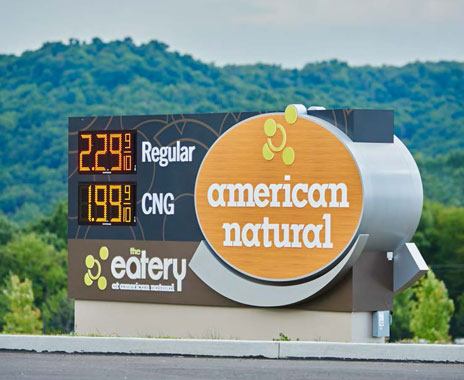Already beset by slowing sales and shrinking profit margins, quick-service restaurants and fast casuals now face competition from a new—and unexpected—source: convenience stores. No longer just a place to grab fuel, coffee, and maybe beef jerky, C-stores have evolved into a $31 billion industry whose leading strategists are placing their future bets on foodservice.
Consider American Natural, a relatively new (2011) and small (14 store) chain in western Pennsylvania and eastern Ohio, now run by a team of female entrepreneurs. CEO Jennifer Pomerantz explains her vision this way: “Somewhere along the way, convenience has come to mean a seemingly less human experience. We have traded good food for fast or processed food. American Natural was driven to create a new ‘Culture of Convenience,’ built on the belief that you shouldn’t have to sacrifice what is important to you and your family. Better food. Better service. Better choices.”
Clearly, the customer is at the center of her equation, as is concept of choice. The latter plays out in two primary ways—by proving choice in fuel for vehicles (gasoline, diesel and compressed natural gas) and in fuel for the human body (fresh, natural products presented in a restaurant setting). In a moment, we’ll see how American Natural brought that vision to life.
Lest you think American Natural is an unusual case, consider these facts from studies by the National Association of Convenience Stores (NACS):
- 10 percent of the 154,000 C-stores in the U.S. are now “Food forward”
- In 2015, 34 percent of in-store, C-store profits came from food and beverage service, up from 22 percent in 2010
- One in seven drivers (16 percent) say that the in-store offering drives their fueling decision; and 8 percent say they bought a sandwich or a meal, and that percentage jumps to 13 percent for ages 18–34
- In May, 2017, NACS announced a relationship with the Partnership for a Healthier America to encourage healthy habits by C-stores and their customers.
- The New York Times recognized this trend in a major feature story on March 11.
The Next Generation C-Store
To “create a Next Generation C-Store that optimizes the sales of freshly prepared food & beverages,” American Natural partnered with King-Casey, a premier retail branding and design firm. Some initial areas of improvement were readily evident— “the low-hanging fruit.” For example, the company’s identity (trade dress) was distinctive, but skewed to a male image and was low on projecting fresh food and a female focus. King-Casey eliminated the male cues.
The core of King-Casey’s recommendations were based on a deep understanding of customer behavior in quick-service restaurants as reflected in their proprietary COZI methodology. COZI stands for Customer Operating Zone Improvement and is based on the fact that stores are not just branded boxes. Each store is a collection of many different “customer operating zones,” and customers behave differently in each one. In the dine-in zone, customers look for a choice of dining environments, depending on whether they are lingering, meeting as a group, or just want to eat and run. So American Natural offers choices that respond to these needs. There is a fast dining zone with counter seating for customers on the go. For groups, there is a socializing dining zone with 4-top tables. For those who want peace and quiet, there is a relaxation dining zone with overstuffed chairs. There is even an outdoor café for alfresco dining.
American Natural’s “Fresh, Quality Food Service” positioning also influenced King-Casey’s design of the new prototype. When you walk into most C-stores, the first thing you see is racks of candy, salted snacks, and tobacco. But, when entering an American Natural new store, the first thing you see is the café bar, different dining zones, and the open kitchen where meals are made to order. Even the espresso machines, rotisserie grill, and pizza oven are showcased to communicate the positioning.
What does mean for quick-serves? American Natural put these ideas to work in a successful prototype re-design that will now be expanded to the rest of the chain. So, the COZI approach is clearly one that competing quick-serves can adopt, such as Starbucks, Del Taco, and many others have already done.
Another customer-centric approach is offered by Envirosell, a long-time partner of King-Casey. Envirosell is a behavioral research and consulting company that has worked on food, C-store and gas station issues around the world for 30 years, and knows what makes customers tick.
Director of Global Communications Deborah Geiger notes that “In a time-pressured culture, the C-store is in a unique position to help customers multi-task. Building customer loyalty and sales is based on relevance, and that relevance is often rooted in food. Basing menuboard design on sound behavioral research is a critical step to building sales, as food historically drives the broader market basket. Give a customer what they like to eat, and you’ll get their gas and beverage purchase too.”
Quick-service restaurants, are you listening?













